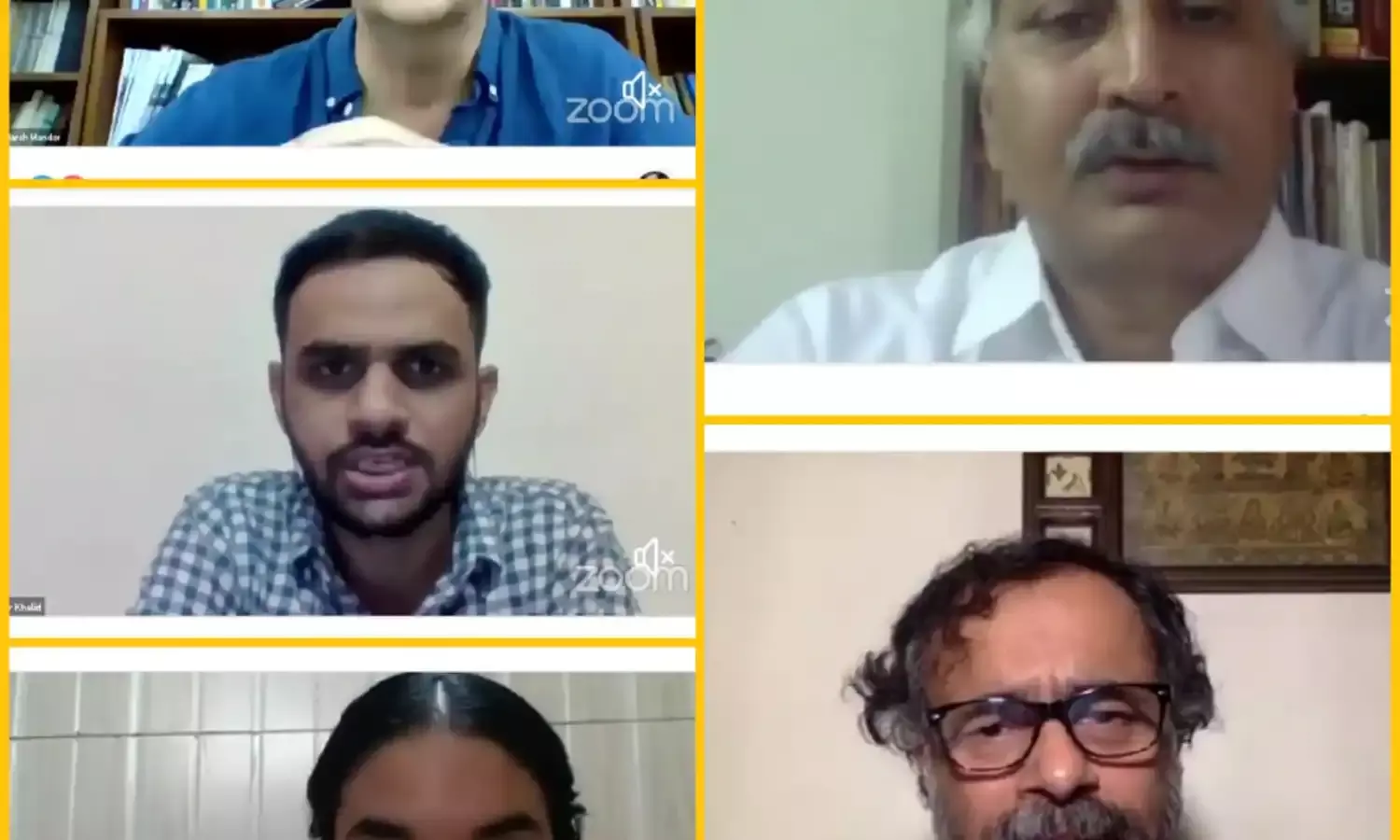Delhi Police 'Witch-Hunting' Anti-CAA Protestors, Say Activists
Press Conference

Activists of the Anti-CAA-NRC-NPR movement, in a press conference on Thursday, raised questions about Delhi Police’s investigations into the Northeast Delhi riots that took place in February, earlier this year. Alleging that the Delhi Police “falsely implicated activists” as “masterminds” of the communal violence that led to the death of 53 people and injured hundreds, the activists asked, “Is this an investigation into a “conspiracy” or is the investigation itself a conspiracy?”
The conference on September 4 was addressed by social activist Harsh Mander, National president of Swaraj India, Yogendra Yadav, JNU student and activist Umar Khalid, Delhi University professor Apoorvanand and Delhi President of the All India Students Association (AISA), Kawalpreet Kaur.
“A critical factor in any riot conspiracy is the role of the state and particularly, the police. No riot can go on for more than a few hours except if the government wishes for it to do so,” stated Mander. “The complicit and partisan role of the police is central to understanding the conspiracy behind the violence,” he added.
The speakers claimed that the Delhi Police has attempted to build a “chronology” of events as part of the conspiracy—beginning with the anti-CAA protests in Jamia Millia Islamia (JMI) and Shaheen Bagh in mid-December and continuing to include other anti-CAA demonstrations in Delhi. However, this chronology “is conspicuously silent on the actions and statements of leaders of the BJP and actual incidents of violence since December,” the activists alleged.
“Is it too much to expect the Delhi Police to probe this angle?” asked Khalid.
The activists raised a series of 11 pointed questions to the Delhi Police, in which they highlighted various incidents—such as the two shootings on protestors at JMI and Shaheen Bagh, and statements made by leaders and supporters of the ruling party (including Kapil Mishra and Anurag Thakur) to “shoot traitors”—that allegedly seem to have been left out in the police investigations.
They stated that while on several occasions, BJP leaders and supporters were seen inciting people to “take the law into their own hands and making hate speeches”, the police has not probed the impact of these statements on the violence that ensued. Instead, the investigation has allegedly chosen to target protestors and supporters of the anti-CAA-NRC-NPR movement—“exactly those whom these hate speeches were made against.”
“Does the Delhi police not consider these utterances as clearly an attempt to provoke violence and promote disaffection and divide between communities?” they asked.
A number of young students and activists are currently in prison under the Unlawful Activities (Prevention) Act. According to the speakers, many were arrested on the basis of different FIRs, and only after they secured bail in these cases was the UAPA used to implicate them in a conspiracy case. Expressing their solidarity with all those jailed under UAPA, the activists asked, “Is this a ploy to keep protestors in jail for long periods, without the need to provide evidence or frame charges?”
Raising the issue of alleged police complicity, the activists said that various videos and reports have emerged as evidence of the same, including the much-circulated video of police officials assaulting four injured men and forcing them to sing the national anthem.
Highlighting instances where the police were allegedly directing mobs pelting stones, breaking CCTV cameras and looking the other way when violence was taking place in front of them, the activists asked whether the police have initiated any action against its personnel or ordered a probe to investigate the same.
They further added, “It has also come to our notice that the police has been coercing people it has summoned for questioning to give false statements. Is this a desperate attempt by the police to buttress its conspiracy theory in the absence of any real credible evidence?”
Over 1000 citizens from all walks of life, including former civil servants, activists, political leaders and academics, also issued a statement on September 4, objecting to the manner in which the Delhi Police has been conducting the investigation into the riots cases.
Citing evidence of “‘confessional’ statements and manufactured evidence”, the signatories—that include names such as Ramachandra Guha, Brinda Karat, Zoya Hasan and Wajahat Habibullah among others—sought an urgent assurance from the Delhi Police Commissionerate that such practices would be stopped and no action will be taken against anyone on the basis of such “fabricated evidence”.
During the conference, Yadav highlighted a statement released by the Press Information Bureau on February 25 post a meeting chaired by Union Home Minister Amit Shah, stating, “Shri Shah noted that the professional assessment is that the violence in the capital has been spontaneous.” Soon after, Shah, contradicting his previous statement, said in Lok Sabha that the riots were a “pre-planned conspiracy”.
Yadav alleged that this statement was made before any investigation into the riots began, asking: “Is the entire investigation just a façade to arrive at pre-meditated conclusions already announced before the investigation had even commenced?”
Drawing parallels with the 1984 anti-Sikh riots, the activists spoke of the impunity granted to “supporters of the ruling dispensations”, adding: “However, this time, the Delhi Police seems to have gone one step ahead, and while providing impunity to the netas, it has started targeting the students and activists who have been critical of the regime.”
“Such a sinister profiling of the democratic mass movement basically criminalizes our basic right to protest against the policies of the ruling dispensation of the day. It erodes public faith in rule of law and chokes democratic dissent,” they said, while reiterating that they would continue the peaceful protest against such “anti-people laws”.



